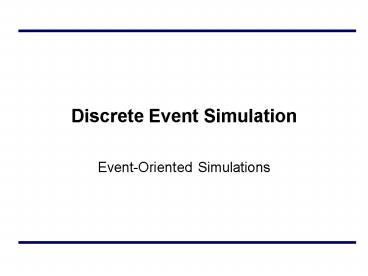Discrete Event Simulation - PowerPoint PPT Presentation
1 / 14
Title:
Discrete Event Simulation
Description:
processed event. current event. unprocessed event. schedules. Simulation Application ... Now: current simulation time. InTheAir: number of aircraft landing or ... – PowerPoint PPT presentation
Number of Views:237
Avg rating:3.0/5.0
Title: Discrete Event Simulation
1
Discrete Event Simulation
- Event-Oriented Simulations
2
Time
- physical time time in the physical system
- Noon, December 31, 1999 to noon January 1, 2000
- simulation time representation of physical time
within the simulation - floating point values in interval 0.0, 24.0
- wallclock time time during the execution of the
simulation, usually output from a hardware clock - 900 to 915 AM on September 10, 1999
3
Simulation Time
- Simulation time is defined as a totally ordered
set of values where each value represents an
instant of time in the physical system being
modeled. - For any two values of simulation time T1
representing instant P1, and T2 representing P2 - Correct ordering of time instants
- If T1
- 9.0 represents 9 PM, 10.5 represents 1030 PM
- Correct representation of time durations
- T2 - T1 k (P2 - P1) for some constant k
- 1.0 in simulation time represents 1 hour of
physical time
4
Paced vs. Unpaced Execution
- Modes of execution
- As-fast-as-possible execution (unpaced) no fixed
relationship necessarily exists between advances
in simulation time and advances in wallclock time - Real-time execution (paced) each advance in
simulation time is paced to occur in synchrony
with an equivalent advance in wallclock time - Scaled real-time execution (paced) each advance
in simulation time is paced to occur in synchrony
with S an equivalent advance in wallclock time
(e.g., 2x wallclock time) - Simulation Time W2S(W) T0 S (W - W0)
- W wallclock time S scale factor
- W0 (T0) wallclock (simulation) time at start of
simulation - (assume simulation and wallclock time use same
time units)
5
Discrete Event Simulation
- Discrete event simulation computer model for a
system where changes in the state of the system
occur at discrete points in simulation time. - Fundamental concepts
- system state (state variables)
- state transitions (events)
- A DES computation can be viewed as a sequence of
event computations, with each event computation
is assigned a (simulation time) time stamp - Each event computation can
- modify state variables
- schedule new events
6
Discrete Event Simulation Computation
example air traffic at an airport events
aircraft arrival, landing, departure
arrival 800
schedules
departure 915
arrival 930
landed 805
schedules
simulation time
- Unprocessed events are stored in a pending event
list - Events are processed in time stamp order
7
Discrete Event Simulation System
8
Event-Oriented World View
9
Example Air traffic at an Airport
- Model aircraft arrivals and departures, arrival
queueing - Single runway for incoming aircraft, ignore
departure queueing - R time runway is used for each landing aircraft
(constant) - G time required on the ground before departing
(constant) - State
- Now current simulation time
- InTheAir number of aircraft landing or waiting
to land - OnTheGround number of landed aircraft
- RunwayFree Boolean, true if runway available
- Events
- Arrival denotes aircraft arriving in air space
of airport - Landed denotes aircraft landing
- Departure denotes aircraft leaving
10
Arrival Events
New aircraft arrives at airport. If the runway
is free, it will begin to land. Otherwise, the
aircraft must circle, and wait to land.
- R time runway is used for each landing aircraft
- G time required on the ground before departing
- Now current simulation time
- InTheAir number of aircraft landing or waiting
to land - OnTheGround number of landed aircraft
- RunwayFree Boolean, true if runway available
- Arrival Event
- InTheAir InTheAir1
- If (RunwayFree)
- RunwayFreeFALSE
- Schedule Landed event _at_ Now R
11
Landed Event
An aircraft has completed its landing.
- R time runway is used for each landing aircraft
- G time required on the ground before departing
- Now current simulation time
- InTheAir number of aircraft landing or waiting
to land - OnTheGround number of landed aircraft
- RunwayFree Boolean, true if runway available
- Landed Event
- InTheAirInTheAir-1
- OnTheGroundOnTheGround1
- Schedule Departure event _at_ Now G
- If (InTheAir0)
- Schedule Landed event _at_ Now R
- Else
- RunwayFree TRUE
12
Departure Event
An aircraft now on the ground departs for a
new destination.
- R time runway is used for each landing aircraft
- G time required on the ground before departing
- Now current simulation time
- InTheAir number of aircraft landing or waiting
to land - OnTheGround number of landed aircraft
- RunwayFree Boolean, true if runway available
- Departure Event
- OnTheGround OnTheGround - 1
13
Execution Example
14
Summary
- Time
- Important to distinguish among simulation time,
wallclock time, and time in the physical system - Paced execution (e.g., immersive virtual
environments) vs. unpaced execution (e.g.,
simulations to analyze systems) - DES computation sequence of event computations
- Modify state variables
- Schedule new events
- DES System model simulation executive
- Data structures
- Pending event list to hold unprocessed events
- State variables
- Simulation time clock variable
- Program (Code)
- Main event processing loop
- Event procedures
- Events processed in time stamp order































